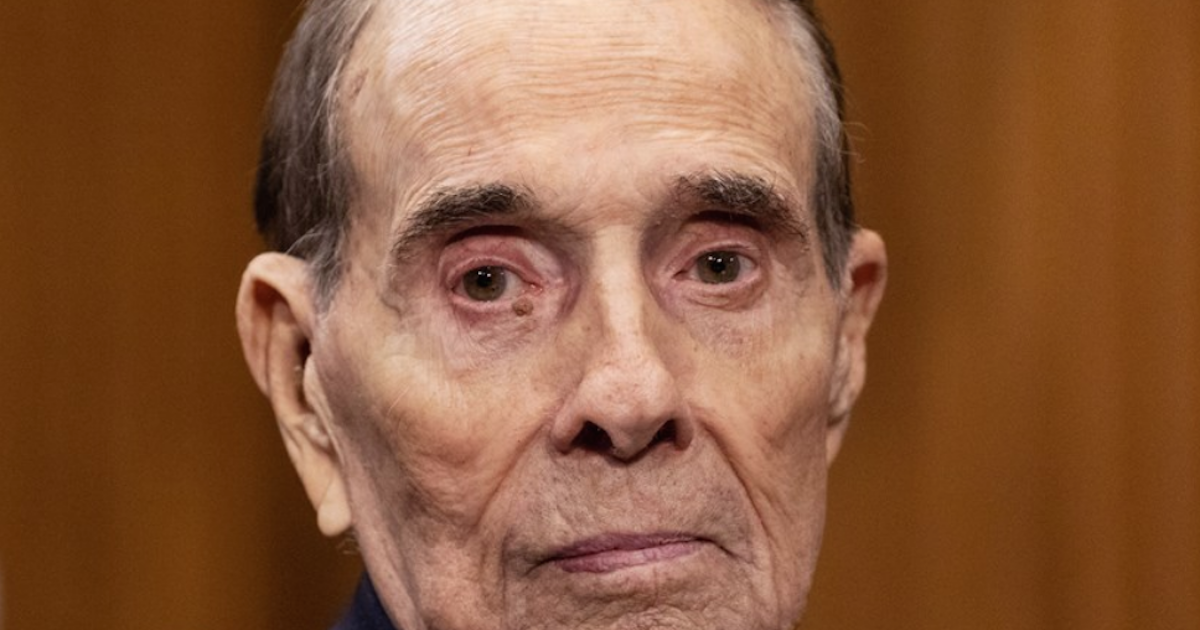Bob Dole at 97
- Former Senator Bob Dole says he’s “doing very well” amid treatment for Stage 4 lung cancer.
- Dole announced his diagnosis in February and said he was beginning treatment.
- Stage four lung cancer, like Dole’s, is typically treated with chemotherapy, radiation therapy, targeted drug therapy and immunotherapy.
“I don't intend to go quietly, because that's up to a higher level,” Dole told correspondent Rita Braver on CBS News Sunday Morning. “I want to try to make 100.”
Read MoreDole shared on Twitter in February that he has been diagnosed with lung cancer. "Recently, I was diagnosed with stage four lung cancer. My first treatment will begin on Monday While I certainly have some hurdles ahead, I also know that I join millions of Americans who face significant health challenges of their own,” Dole said.
While the Sunday interview didn’t specifically address Dole’s lung cancer, he did say he is “doing very well.”
“But I have to keep in mind that I'm also going to be 98 in July. So I'm getting to be a senior citizen,” he said with a chuckle.
As for staying busy, Dole says he’s keeping a pact made years ago. “My pledge one time was to make a difference in the life of at least one person every day,” he said. “Now I've probably failed at part of that, but I still work at it.”
Advanced Lung Cancer Treatments
Stage four lung cancer, like Dole’s, is typically treated with chemotherapy, radiation therapy, targeted drug therapy and immunotherapy.
There’s an increase in the number of options available for patients with later stage lung cancer. These include, most notably, immunotherapy in the form of checkpoint inhibitors that actually turn off a part of the immune system that is stopping the body from fighting the cancer.
Noble Prize winner Dr. Jim Allison explains immunotherapy combinations
In a previous conversation with SurvivorNet, Dr. Jim Allison, who won the Nobel Prize in 2019 for his part in developing checkpoint inhibitors, said, “We identified these brakes on the immune system and figured out how to use those to keep T-cells that are in your body going and generate big numbers … of T-cells that will kill cancer cells.”
What’s important to know about this class of medication is the effectiveness is largely dependent on the amount of a specific protein the patient has, called PD-L1. A patient who has more of a PD-L1 expression will respond much better to checkpoint inhibitors.
Related: Managing Pain and Discomfort after Lung Cancer Surgery
Targeted Therapies
For a small but significant percentage of lung cancer patients, genetic testing and significant research has created a new type of treatment that can target specific genetic mutations.
"It's amazing to me now that you can have stage 4 lung cancer and actually not even need chemotherapy," Dr. Brendon Stiles, chief of thoracic surgery & surgical oncology at Montefiore and Albert Einstein College of Medicine, told SurvivorNet in a previous conversation. "If you have high expression of a protein that we know is targeted by immunotherapy, you may just get immunotherapy alone."
Erlotinib (Tarceva) and gefitinib (Iressa) are among the first targeted drugs approved to treat lung cancer, he explained. These and other similar drugs given as pills target epidermal growth factor receptor (EGFR), a protein that, when overreactive, makes cancer cells grow and divide.
These mutations are more common in people with lung cancer who are female or who have never smoked, Dr. Ronald Natale, director of the Lung Cancer Clinical Research Institute at the Cedars-Sinai Medical Center, told SurvivorNet.
Dr. Ronald Natale on targeted therapy for lung cancer
These drugs have had success in prolonging the time that the cancer does not worsen, both alone and in combination with chemotherapy and immunotherapy. If the cancer does develop resistance to the drug, alternative treatments are then considered.
On Friday, the FDA approved a new treatment for people with lung cancer that is particularly resistant to treatment because it contains a genetic mutation called KRAS. The Food and Drug Administration (FDA) approved a drug called sotorasib (brand name: Lumakras) for lung cancer patients whose tumors have a mutation called KRAS G12C and whose cancer has spread even after treatment with chemotherapy or other medications.
Coping with a Diagnosis
Getting a cancer diagnosis of a late-stage cancer can be challenging. But there are resources out there to help cope with the complicated emotions that may result from a diagnosis.
Related: A Major Step in the Cancer Journey: Learning to Deal With Vulnerability
Some people experience grief, depression, and anxiety after a cancer diagnosis. Therapy, support groups, and other formal resources can be a helpful way to process this new reality. Camila Legaspi was in high school when she lost her mom to breast cancer, and she credits therapy with saving her, and seeing her through that rough period. In a previous interview, Legaspi says, “Embrace the situation as best as you can, because the reality is … that it sucks.”
“I was dealing with some really intense anxiety and depression at that point,” she says. “It just changed my life because I was so drained by all the negativity that was going on. Going to a therapist helped me realize that there was still so much out there for me … that I still had my family, that I still had my siblings."
"Therapy Saved My Life": After Losing A Loved One, Don't Be Afraid To Ask For Help
Learn more about SurvivorNet's rigorous medical review process.


